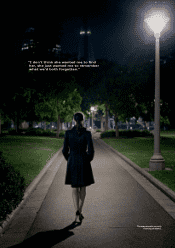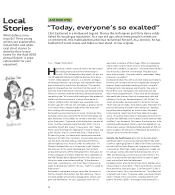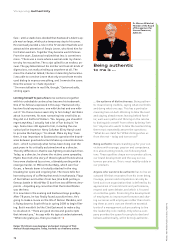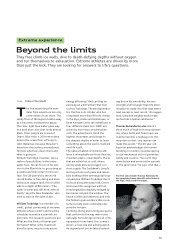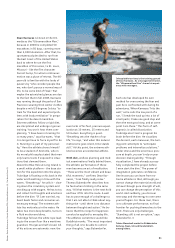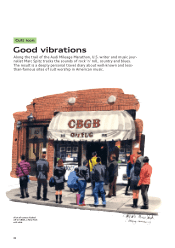Audi 2008 Annual Report Download - page 79
Download and view the complete annual report
Please find page 79 of the 2008 Audi annual report below. You can navigate through the pages in the report by either clicking on the pages listed below, or by using the keyword search tool below to find specific information within the annual report.
76
Vorsprung Authenticity
Being authentic
to me is …
Dr.Werner Widuckel,
Member of the Board
of Management for
Human Resources,
AUDI AG
… the epitome of distinctiveness. Being authen-
tic means being credible, saying what one thinks
and doing what one says. This has a particular
meaning here at Audi. Working to take the lead
and staying ahead means leaving behind famil-
iar, well-worn paths and thriving on the resolve
to distinguish oneself from others by being “bet-
ter.” Anyone who wants to take the lead and stay
there must repeatedly answer the questions:
“What do we stand for? What distinguishes us
from the rest – today and tomorrow?”
Being authentic means standing up for your con-
victions with courage, passion and competence.
It is about setting trends, not following fash-
ions. These qualities shape our corporate culture,
our brand development and the way our cus-
tomers perceive us. This is most readily visible in
our products.
Anyone who wants to be authentic has to live an
outward life that resonates from his inner being.
Courage, passion and competence can only be
lived out in an organization that is defined by its
appreciation of commitment and performance,
respect and open debate, and which is focused
on collective goals. Promoting the development
of employees to improve performance and shar-
ing successes with employees rather than claim-
ing them as one’s own are therefore essential
traits of a management culture seeking to live
the leadership role credibly. Only when a com-
pany provides the space for people to deal and
behave authentically, will it be truly authentic.
face – until a studio boss decided that Eastwood’s Adam’s ap-
ple was too large, which put a temporary stop to his career.
He eventually landed a role in the TV western Rawhide and
attracted the attention of Sergio Leone, who hired him for
his Italian western. Together they became world-famous.
From the start, Eastwood realized that less is sometimes
more. “There was a scene where a woman asks my charac-
ter why he rescued her. The script called for an endless an-
swer. The guy talked about his mother and took all kinds of
digressions, not really winding up anywhere at all. The
more the character talked, the less interesting he became.
I was able to convince Leone that only second-rate movies
used dialog to express everything, and I rewrote the scene.
Now the answer is: I hate injustice.”
“I’m more talkative in real life, though,” Eastwood adds,
smiling again.
Limiting himself to just a few terse sentences together
with his unshakable coolness has become his trademark.
One of his fellows expressed it this way: “Eastwood only
has two facial expressions: one with the hat and one with-
out it.” Do those movies seem silly to him today? He thinks
about it a moment, his eyes narrowing into small slits as
they did in A Fistful of Dollars. “No. Anyway, you shouldn’t
regret anything. I actually had a lot of fun doing it,” he
says. Some lines still appeal to him, including the one
cynical police inspector Harry Callahan (Dirty Harry) used
to provoke the bad guys: “Go ahead. Make my day.” Even
then, it was important to Eastwood to question the bound-
aries between good and evil and shake up conventional wis-
dom – which is precisely what he has been doing over the
past years in his critically acclaimed work as a director.
The only difference is that he was fighting crooks back then.
Today, as a director, he shows the victims some sympathy.
Mystic River tells the story of three boyhood friends whose
lives were shattered by a crime, ultimately ending with a
revenge murder. In Million Dollar Baby, which won four
Oscars, a female boxer is brutally attacked in the ring,
breaking her spine and crippling her. The movie tells her
harrowing story of suffering that ends in euthanasia. Flags
of Our Fathers and Letters from Iwo Jima both portray a
famous battle in World War II but from two different view-
points – dispelling any conviction that the United States
was the hero.
It is now late in the evening and Eastwood says goodbye.
After 78 years, he has finally found a positive hero. He’s
going to make a movie on the life of Nelson Mandela, and
is flying down to South Africa in spring 2009 to begin film-
ing. But it wouldn’t be like Clint Eastwood to make a big
to-do about it. “There are good stories and good scripts
that interest you,” he says with his typical understatement.
“When one grabs you, then you make it.”
Photos: Neil Wilder/Corbis Outline, AUDI AG
Holger Christmann was developer and project manager of Park
Avenue lifestyle magazine. Today, he works as a freelance author.
/
/


